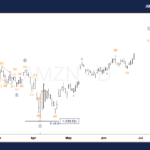
Many of the famous and ultra-wealthy are endorsing and throwing money at either Vice President Kamala Harris or former President Donald Trump. Just last night, The New York Times reported Microsoft founder Bill Gates quietly donated a whopping $50 million to the Harris campaign.
But one of the world’s richest men completely refuses to reveal his support for any candidate: Warren Buffett. And it’s probably not for a reason you’d expect. It has nothing to do with any potential hits to his business that might come from supporting one candidate over the other; it’s because he’s frustrated with people impersonating him online. He’s so worried, in fact, that Berkshire Hathaway added a statement to the front page of its antiquated website to clear the air about their chairman and CEO’s political and investment product endorsements.
“In light of the increased usage of social media, there have been numerous fraudulent claims regarding Mr. Buffett’s endorsement of investment products as well as his endorsement and support of political candidates,” the statement reads. “Mr. Buffett does not currently and will not prospectively endorse investment products or endorse and support political candidates.”
The concern comes just weeks after New York Attorney General Letitia James issued a warning about investment scams using AI-manipulated videos and deepfakes intended to deceive potential investors.
“Sophisticated scammers are using AI to impersonate trusted business leaders and scam vulnerable New Yorkers out of their hard-earned money,” James said in an Aug. 29 statement. “Manipulated videos advertising phony investment scams are spreading like wildfire on social media.”
One such AI-generated video shows Buffett appearing to promote a “Bitcoin giveaway” on Fox News. The outlet confirmed the clip was fake and was never actually aired.
“I don’t even know how to get on Instagram,” Buffett told CNBC. “Anything they see with my image or my voice, it just ain’t me.”
In another statement just a week later, James also warned of fraudulent political endorsements.
“AI-created deepfakes that spread lies about candidates, policy proposals, and even where New Yorkers can access the polls all represent a dangerous threat to democracy,” she said in a Sept. 9 statement.
Deepfakes could influence the presidential election
Other billionaires and celebrities have fallen victim to deepfakes this year, including Trump, Taylor Swift, Elon Musk, Joe Biden, Will Smith, Beyoncé, and Mark Zuckerberg. In fact, the problem has gotten so severe a new public-service campaign featuring actor Rosario Dawson and other Hollywood stars including Chris Rock, Laura Dern, Michael Douglas, Amy Schumer, and Jonathan Scott launched this week aiming to alert Americans to not be fooled by the AI-generated deepfakes.
“No one should come between an American and their vote,” Dawson told NBC News in a statement. “Unfortunately, it’s safe to say people are going to try.”
Political consultants Julius van de Laar and Craig Oliver have been warning of the dangers of artificial intelligence’s influence on the election since the spring. Speaking at Fortune’s Brainstorm AI conference in April, they said deepfakes could alter the outcome of the 2024 presidential election.
“The problem is this space is almost completely unregulated. You’re in a situation where there are no rules. And the truth about politics is if there isn’t a rule someone will say, ‘Well, my opponent will use it if I don’t’,” said Oliver, global co-head of strategy and reputation at communications consultancy FGS Global. “It becomes a race to the bottom.”






